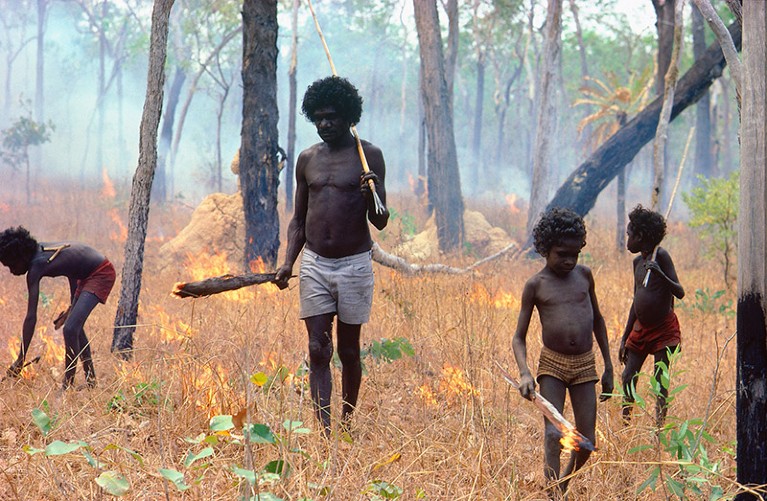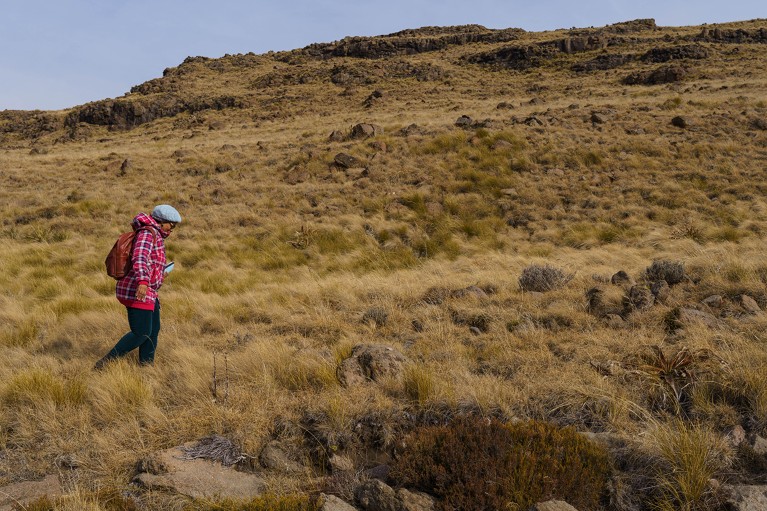Hello Nature readers, would you like to get this Briefing in your inbox free every day? Sign up here.

Northern Australian elder George Milpurrurr shows the next generation how to do a cultural burn.Credit: Penny Tweedie/Alamy
Fire farming began 11,000 years ago
Indigenous Australians have been using fire to shape the country’s northern ecosystems for thousands of years. Researchers analysed charcoal that was preserved in the sediment of a flooded sinkhole over the last 150,000 years. They discovered that, around 11,000 years ago, there was a shift to more frequent but less intense fires as a result of Indigenous fire-stick farming. European colonization mostly brought an end to the practice, which might have contributed to the return of more high-intensity wildfires.
Reference: Nature Geoscience paper
First cell therapy for solid tumours
The first immune-cell therapy for solid tumours, Iovance Biotherapeutics’ lifileucel, has been approved by the US Food and Drug Administration. At least 20 people with advanced melanoma will receive the treatment, which uses cancer-killing immune cells extracted from a person’s own tumour. Researchers hope that the approval will pave the way for cheaper versions — lifileucel costs more than half a million dollars — as well as similar therapies for other cancers, including lung and pancreatic tumours.
Uncertainty for China–US climate collab
Both the US and Chinese climate envoys, John Kerry and Xie Zhenhua, are stepping down — and scientists worry that the change will rattle the cooperative spirit between the world’s two biggest carbon emitters. The new envoys, diplomat Liu Zhenmin and strategist John Podesta, bring some climate credentials, but it remains to be seen how well they work together. The upcoming US elections and broader geopolitical tensions remain major hurdles to achieving global climate goals. “The biggest uncertainty is American politics,” says public policy researcher Wang Yi.
Features & opinion
How to prevent a ‘gold rush’ in space
The cold war-era laws that govern space exploration are not fit for purpose any more, argues philosopher A. C. Grayling in Who Owns the Moon? Without a bold new consensus, Grayling predicts, a space ‘wild west’ is going to emerge as nations and companies clamour for extraterrestrial resources. The 1959 Antarctic Treaty and the law of the sea could both provide templates for negotiations, but neither agreement transposes readily to outer space, says reviewer and Space Governance Lab founder Timiebi Aganaba. Instead, there could be lessons to learn from the ongoing climate change-induced reconsideration of resource exploitation, she says. “Any future dispute-resolution mechanisms must balance inclusivity and justice.”
The discovery of brain hormones
Neuroscientist Roger Guillemin spent much of the 1950s and 60s dissecting millions of sheep brains and separating their peptides with 3-metre-tall chromatography columns that extended through the lab’s ceiling. His efforts paid off: he determined the structure of the thyrotropin-releasing factor, a small peptide that triggers a cascade of hormones that regulate metabolic activity in nearly every tissue of the body. What followed was a torrent of advances in neuroendocrinology, including more than two dozen drugs to treat endocrine disorders and cancers. In 1977, Guillemin shared the Nobel Prize with Andrew Schally, his former student turned competitor. Guillemin has died, aged 100.
‘AI can't replace having something to say’
The editors of Nature Reviews Physics and Nature Human Behaviour have teamed up to explore the pros and cons of using generative artificial intelligence (AI) systems such as ChatGPT in science communication. Chatbots ‘hallucinate’ convincing inaccuracies and they make churning out disinformation all too easy, write the editors — and they have “an obvious, yet underappreciated” downside: they have nothing to say. Ask an AI system to write an essay or an opinion piece and you’ll get “clichéd nothingness” — “the AI system has no agency in writing or otherwise.”
Interviews with six experts in Nature Human Behaviour reveal that they broadly agree that generative AI systems can be useful tools. But they are clear-eyed about the risks. “Given the much-publicized propensity of generative AI tools to produce nonsense, science communicators should consider whether generative AI is in fact completely antithetical to the very purpose of their work,” says Amanda Alvarez, a communications specialist at the Finnish Center for Artificial Intelligence.
In Nature Reviews Physics, seven other experts delve into the key role of science communication in building trust between scientists and the public. “Regular, long-term dialogical interaction, preferably face-to-face, is one of the most effective ways to build a relationship based on trust,” notes science-communication researcher Kanta Dihal. “This is a situation in which technological interventions may do more harm than good.”
Nature Reviews Physics editorial | 4 min read, Nature Human Behaviour feature | 10 min read & Nature Reviews Physics viewpoint | 16 min read
Where I work

Lerato Seleteng-Kose is a botanist working at the National University of Lesotho in Roma.Credit: Barry Christianson for Nature
“It’s almost always windy and cold up here,” says botanist Lerato Seleteng-Kose about the Bokong Nature Reserve, where she tracks plants such as the Lesotho red-hot poker (Kniphofia caulescens). “Lesotho provides water to some of the most populous parts of neighbouring South Africa, so the health of these wetlands matters to a large number of people.” (Nature | 3 min read) (Barry Christianson for Nature)
